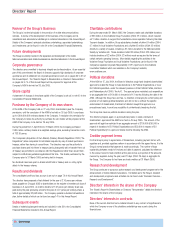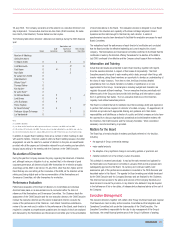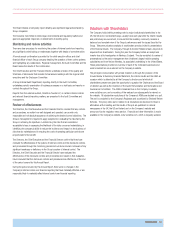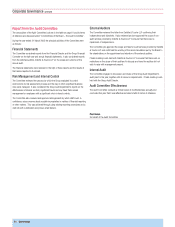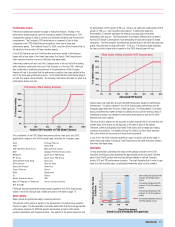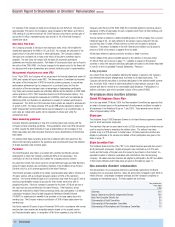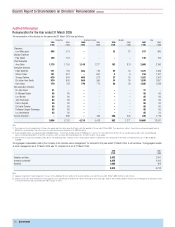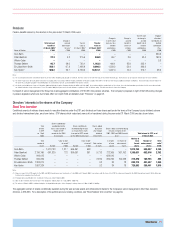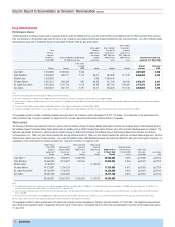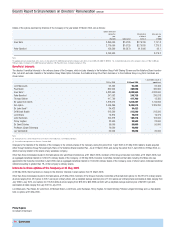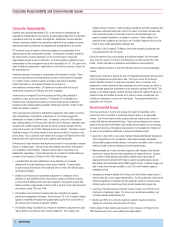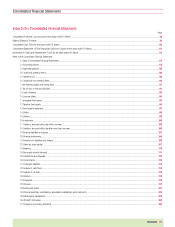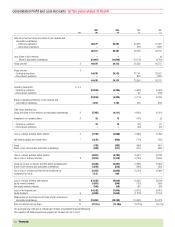Vodafone 2005 Annual Report Download - page 70
Download and view the complete annual report
Please find page 70 of the 2005 Vodafone annual report below. You can navigate through the pages in the report by either clicking on the pages listed below, or by using the keyword search tool below to find specific information within the annual report.
Board’s Report to Shareholders on Directors’ Remuneration continued
68 |Governance
For example, if the Company’s share price increases by over 50% from 140 pence to
approximately 210 pence, the Company’s value increases by £46 billion, and there is
50% vesting of long term incentives, the Chief Executive would have a pre-tax gain of
just under £4 million, representing less than a tenth of 1% of the total increase in
shareholder value.
New Share Plan Rules
The Company proposes to introduce new share plan rules, which will be tabled for
shareholder approval at the AGM on 26 July 2005. No changes are proposed to the
award policy for Executive directors or other participants. The Company wishes to
introduce one consistent set of rules under which all long term incentives may be
awarded. The new rules will comply with the latest UK corporate governance
guidelines and industry best practice. Full details of the proposed rules can be found in
the notice of the 2005 AGM. Any future changes to the award policy for the Board will
be discussed with major shareholders and relevant institutions prior to implementation.
Measurement of performance under IFRS
From 1 April 2005, the Company will no longer report its financial statements under UK
GAAP, and instead will report under IFRS. The Remuneration Committee has reviewed
the impact of the introduction of IFRS for incentive scheme purposes, to ensure that
performance achievement can be measured on a consistent basis and that the
introduction of the new standard does not advantage or disadvantage participants.
Only three past incentive awards are potentially affected by the transition to IFRS: GMR
options granted in 2001, 2002 Executive Options and 2003 Executive Options. The
2001 GMR options include the measurement of EBITDA, which will not materially be
affected by IFRS, and therefore no adjustment is required to measure performance
achievement. The 2002 and 2003 Executive Option grants are subject to achievement
of growth in EPS. For these schemes, EPS under IFRS will be adjusted to reflect UK
GAAP measurement so that performance may be measured on a consistent basis. In
each case, an independent auditor will be requested to review and verify the
achievement level.
Share ownership guidelines
Executive directors participating in long term incentive plans must comply with the
Company’s share ownership guidelines. These guidelines, which were first introduced
in 2000, require the Chief Executive to have a shareholding in the Company of four
times base salary and other executive directors to have a shareholding of three times
base salary.
It is intended that these ownership levels will be attained within five years from the
director first becoming subject to the guidelines and be achieved through the retention
of shares awarded under incentive plans.
Pensions
The Chief Executive, Arun Sarin, is provided with a defined contribution pension
arrangement to which the Company contributes 30% of his base salary. The
contribution is held in a notional fund outside the Company pension scheme.
Sir Julian Horn-Smith, Ken Hydon (until his normal retirement age) and Peter Bamford,
being UK based directors, are contributing members of the Vodafone Group Pension
Scheme, which is a UK scheme approved by the Inland Revenue.
This Scheme provides a benefit of two-thirds of pensionable salary after a minimum of
20 years’ service, with a contingent spouse’s pension of 50% of the member’s
pension. The normal retirement age is 60, but directors may retire from age 55 with a
pension proportionately reduced to account for their shorter service but with no
actuarial reduction. Pensions increase in payment by the lower of 5% per annum or
the maximum amount permitted by the Inland Revenue. Peter Bamford, whose
benefits are restricted by Inland Revenue earnings limits, also participates in a defined
contribution Vodafone Group Funded Unapproved Retirement Benefit Scheme
(“FURBS”) to enable pension benefits to be provided on his base salary above the
earnings cap. The Company makes a contribution of 30% of base salary above the
earnings cap.
Ken Hydon reached 60 years of age in November 2004 and in accordance with normal
pension plan rules received an immediate pension based on his accrued service
and final pensionable salary. In recognition of Mr Hydon agreeing to stay with the
Company until the end of the 2005 AGM, the Committee agreed to provide a pension
allowance of 30% of base salary for each complete month from his 60th birthday until
he steps down from the Board.
Thomas Geitner is entitled to a defined benefit pension of 40% of salary from a normal
retirement age of 60. On early retirement, the pension may be reduced if he has
accrued less than 10 years of Board service, but will not be subject to actuarial
reduction. The pension increases in line with German price inflation and a spouse’s
pension of 60% of his pension is payable from his death.
All the plans referred to above provide for benefits on death in service.
Further details of the pension benefits earned by the directors in the year ended
31 March 2005 can be found on page 71. Liabilities in respect of the pension
schemes in which the executive directors participate are funded to the extent described
in note 32 to the Consolidated Financial Statements, “Pensions”.
A-Day proposals
As a result of the new UK legislation affecting the taxation of pensions, the Company
has reviewed the pension arrangements it provides to UK based executives. The
Company will permit executives to continue participation in the defined benefit scheme
and, from April 2006, intends to permit executives to cease pension accrual in this
scheme and elect to receive a non-pensionable cash allowance. Participation in a
defined contribution plan will be provided in place of the current FURBS.
All-employee share incentive schemes
Global All Employee Share Plan
As in the year ended 31 March 2004, the Remuneration Committee has approved that
an award of shares based on the achievement of performance conditions be made to
all employees in the Vodafone Group on 1 July 2005. These awards have a dilutive
effect of approximately 0.03%.
Sharesave
The Vodafone Group 1998 Sharesave Scheme is an Inland Revenue approved scheme
open to all UK permanent employees.
The maximum that can be saved each month is £250 and savings plus interest may be
used to acquire shares by exercising the related option. The options have been
granted at up to a 20% discount to market value. UK based executive directors are
eligible to participate in the scheme and details of their participation are given in the
table on page 73.
Share Incentive Plan
The Vodafone Share Incentive Plan (“SIP”) is an Inland Revenue approved plan open to
all UK permanent employees. Eligible employees may contribute up to £125 each
month and the trustee of the plan uses the money to buy shares on their behalf. An
equivalent number of shares is purchased with contributions from the employing
company. UK based executive directors are eligible to participate in the SIP and details
of their share interests under these plans are given in the table on page 74.
Non-executive directors’ remuneration
The remuneration of non-executive directors is periodically reviewed by the Board,
excluding the non-executive directors. Basic fee levels were increased in April 2005 to
reflect directors’ considerably increased workload and the increased complexity of
managing an international group. The fees payable are as follows:
Fees payable from
1 April 2005
£’000
Chairman 510
Deputy Chairman and Senior Independent Director 120
Basic Non-Executive Director fee 95
Chairmanship of Audit Committee 20
Chairmanship of Remuneration Committee 15
Chairmanship of Nominations and Governance Committee 10


